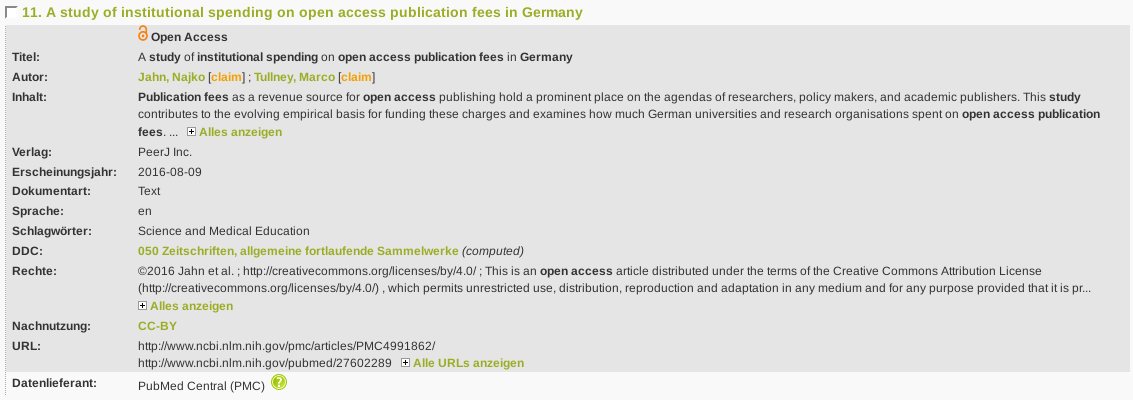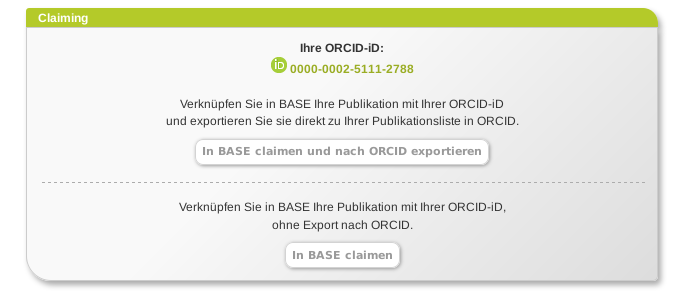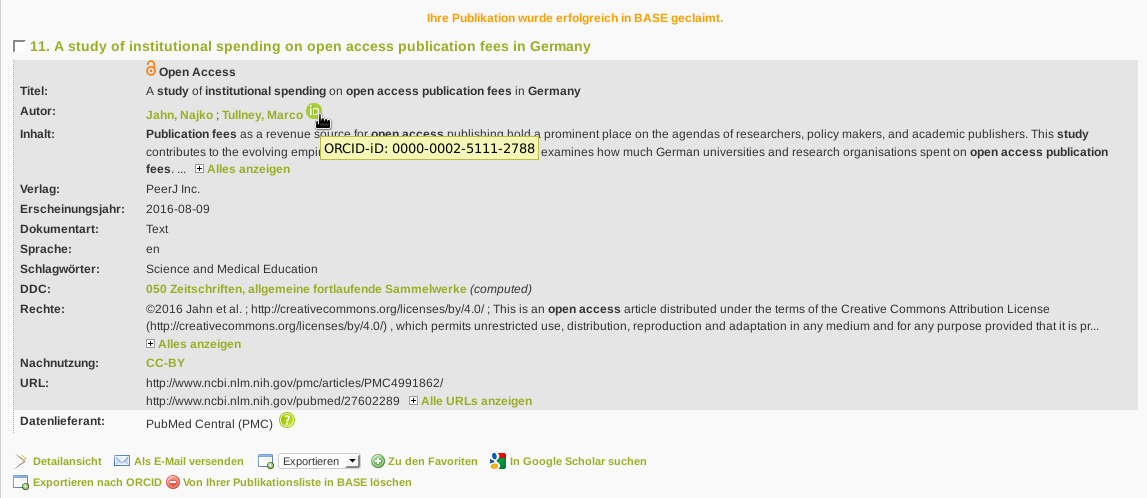ORCID identifiers in bibliographic metadata: integration in BASE
An ORCID integration feature was recently added to the Bielefeld Academic Search Engine BASE. This feature enables authors of indexed publications to be linked to ORCID profiles and publications marked in this way for registration with ORCID.
Featuring well over 100 million entries, BASE is an exceptionally large open source of metadata on academic publications. It gathers metadata from a huge number of sources via OAI-PMH. ORCID acts as a registry for unique identifiers for individuals (academic contributors), as well as managing information about their publications, projects, biographies, etc. The ORCID API can be used to enable other services (particularly those provided by ORCID members) to exchange data with ORCID. The enrichment of metadata with ORCID iDs has been put on the agenda as part of the project ORCID DE, in which UB Bielefeld is involved.
A growing number of journals and repositories incorporate an ORCID interface to enable publications to be linked directly to contributors’ ORCID profiles. Conversely, ORCID users find it easy to search the metadata of Crossref and DataCite (and other services) in order to simply add the publications listed there to their own profiles (now even automatically).
And yet many articles are still published without any mention of contributors’ ORCID iDs – and of course no earlier publications have any mention of ORCID. This is why introducing a link to ORCID is particularly important for bibliographic databases: a unique contributor’s identifier can be added to previously ambiguous metadata.
I’ve checked out the new BASE feature, and played it through using one of my own articles as an example.
Searching for articles
A search for a particular article or contributor’s name comes up with hits that do not usually contain any reference to an ORCID iD. At this point, BASE now enables publications to be “claimed” by its authors.

Claiming authorship
First of all, a user account is created at base-search.net. Creating a profile involves linking it to your ORCID account.

Having registered successfully, you then have the choice of only marking the authorship or of noting the authorship as well as including the publication’s metadata in your own list of publications with ORCID.

Enriched entries in BASE
Once authorship has been “claimed” in BASE, the ORCID iD is added to the contributor’s details in BASE:

Users can now see that an ORCID profile exists for this contributor, and a link is established to the profile by means of a hyperlink.
Conclusion
On the whole, the BASE team has implemented a beneficial feature. It is most useful to be able to link listed publications with ORCID details, even in cases where the ORCID iD was not given in the original publisher’s metadata. Reporting publications to ORCID strikes me as being obsolete in many cases, at least when your own ORCID profile is kept sufficiently up-to-date. To me, it seems to make more sense for the time being to complete a newly created ORCID profile using metadata obtained via Crossref and DataCite.
I find it very useful to include the scientific contributors in this process and to enable data enrichment. Additional possibilities are bound to follow, e.g. via GND-ORCID mapping.
The fact that BASE contains duplicates may pose a bit of a problem, because redundant data sources are queried and deduplication (e.g. using the DOI) does not yet occur. These duplicates would then be included in the ORCID metadata. Improved deduplication options may help in the future. It also remains to be seen what happens in the case of false claims – if any valid ORCID account can claim a BASE search result for itself, will plausibility checks (based on the name) take place automatically? And what if the sources that provide BASE with data report an incorrect ORCID iD for an author ‒ can this information be corrected in BASE? It could be that Bielefeld University Library has already resolved these issues, but all future ORCID implementations in library catalogues and current research information systems at least will have to address these issues, too.
It would be interesting to find out the extent to which BASE datasets are enriched with ORCID iDs, and how users go about doing so. Perhaps Bielefeld University Library will provide an update on this in a few months’ time.
... leitet den Bereich Publikationsdienste der TIB und koordiniert deren Open-Access-Aktivitäten.


Eine Antwort auf “ORCID identifiers in bibliographic metadata: integration in BASE”